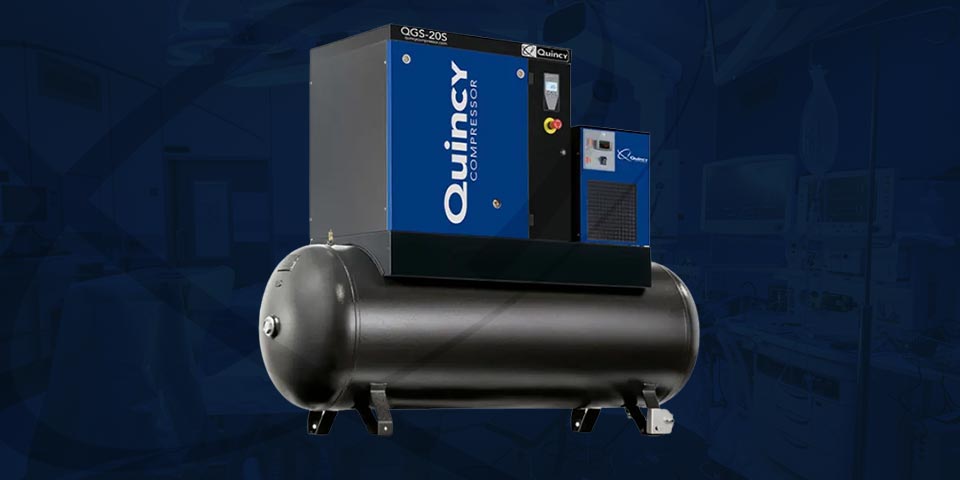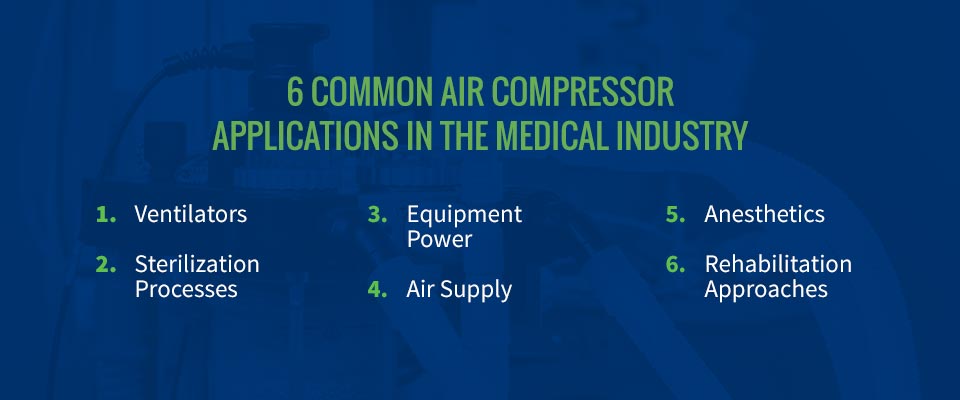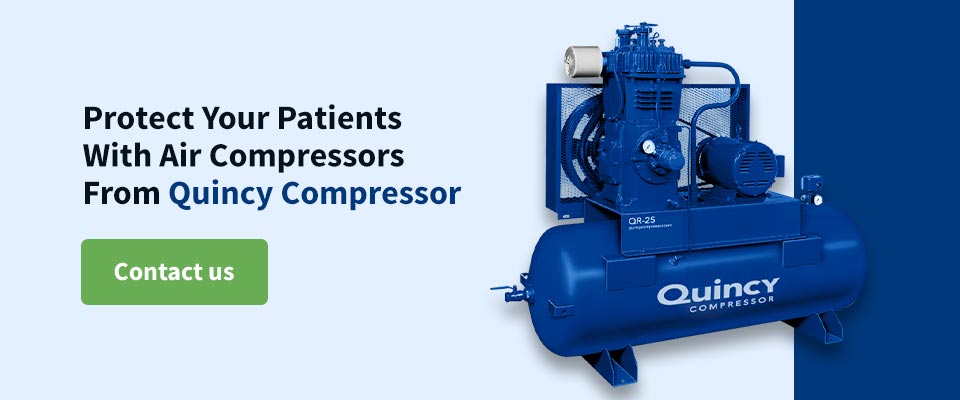
Compresores de aire para la industria médica
Los profesionales médicos dependen de los compresores de aire para aumentar la salud y la seguridad en las instalaciones. El aire comprimido puede proporcionar a los pacientes aire seguro para respirar mientras reciben tratamiento, y puede ayudar a limpiar y alimentar los equipos y herramientas esenciales que mantienen en funcionamiento los campos sanitarios.
Encuentra un concesionario cerca de ti
6 Aplicaciones comunes de compresores de aire en la industria médica
Las instalaciones médicas utilizan el aire médico para múltiples propósitos, dependiendo del sector específico. La mayoría de los usos satisfacen la necesidad de oxígeno seguro y fácilmente accesible. Este tipo de aire comprimido proporciona a hospitales y otros centros sanitarios un suministro constante de aire libre de contaminantes, partículas, aceites, olores y humedad. La forma en que cada campo médico utiliza el aire médico depende de sus operaciones diarias y de las necesidades de los pacientes.
A continuación, se presentan seis usos comunes del aire medicinal comprimido.
1. Ventiladores
En todas las prácticas y aplicaciones médicas, los ventiladores son uno de los usos más comunes de aire comprimido de grado médico. Los ventiladores proporcionan a los pacientes aire médico seguro y comprimido para aumentar el suministro de oxígeno y la comodidad durante el tratamiento. Los profesionales médicos utilizan ventiladores en muchos entornos, entre ellos:
- Cirugías y operaciones
- Unidades de cuidados intensivos (UCI)
- Tratamientos relacionados con la COVID-19
- Apoyo para pacientes sensibles a la toxicidad por ogénito, como los fumadores
- Salas neonatales con modelos de ventiladores más pequeños
Con tantas aplicaciones, los compresores de aire en el ámbito sanitario ayudan a los profesionales a tratar mejor a los pacientes. Debido a que el aire médico es tan limpio, los cuidadores pueden reducir el riesgo de infecciones respiratorias y complicaciones con este método de asistencia respiratoria.
2. Procesos de esterilización
Desde laboratorios hasta equipos dentales, la industria médica necesita acceso a herramientas estériles. Los procesos de esterilización garantizan que los profesionales puedan utilizar el equipo que necesitan para ofrecer la mejor atención a sus pacientes. El aire comprimido puede ayudar a los procesos de secado para reducir contaminantes y partículas que pueden entrar en los sistemas para obtener herramientas y equipos disponibles más limpios. Este sistema es manos libres para eliminar el contacto con el equipo antes de su uso.
3. Alimentación del equipo
Los compresores de aire son fuentes de energía precisas y fiables que pueden ayudar a que las herramientas funcionen. El suministro de aire limpio puede mantener los equipos libres de suciedad y aceite que dañan componentes y disminuyen su eficiencia y vida útil. El aire comprimido puede mantener el funcionamiento normal del equipo cuando la industria médica requiere consistencia y fiabilidad. Algunos equipos que funcionan con aire comprimido incluyen:
- Camas de hospital: Los pacientes y los médicos a menudo necesitan ajustar la altura de las camas hospitalarias para la comodidad del paciente y para mejorar su accesibilidad. La mecánica de estas características utiliza aire comprimido para movimientos precisos y mejor atención durante las estancias hospitalarias.
- Herramientas dentales: Durante las visitas de higiene, los dentistas necesitan ambientes secos para limpiar correctamente los dientes. Para ello, secan la boca de los pacientes con aire comprimido porque carece de humedad y puede preparar mejor la boca para la limpieza.
- Simuladores de enseñanza médica: Los estudiantes de medicina pueden usar simulaciones humanas para practicar sus habilidades antes de trabajar con pacientes vivos. Los modelos y bots pueden usar compresores de aire para representar procesos específicos, como la respiración. Los estudiantes pueden utilizar estas opciones para mejorar y convertirse en mejores profesionales cuando se gradúen.
El aire comprimido en estas aplicaciones garantiza que los hospitales y otras instalaciones médicas puedan contar con su equipo para atender a los pacientes, independientemente de la situación y la urgencia.
4. Suministro de aire
Aunque los hospitales necesitan aire médico para la entrega directa de oxígeno en ventiladores, también deben proteger la salud de otros pacientes mediante la calidad del aire. Los hospitales utilizan aire medicinal en todo su sistema de ventilación, por lo que los pacientes siempre tienen acceso al aire más saludable posible. Respirar aire medicinal puede reducir el riesgo de que bacterias, polvo, humedad y otras partículas de aire entren en el cuerpo a través del sistema respiratorio y protege mejor a los pacientes que ya están enfermos y debilitados.
Los hospitales utilizan configuraciones complicadas de aire comprimido para garantizar la calidad del aire y los estándares de salud. Estos sistemas aseguran que el aire pase por toda la filtración necesaria antes de llegar a pacientes, profesionales y visitantes.
5. Anestesia
Además de alimentar equipos de quirófano y proporcionar aire limpio a través de ventiladores, los profesionales médicos utilizan aire médico al administrar anestesia en cirugías. El aire médico transporta estos gases críticos al sistema de los pacientes, permitiendo que médicos y dentistas operen de forma segura y eficiente, reduciendo cualquier dolor que el paciente pueda experimentar.
6. Enfoques de rehabilitación
Aunque muchos médicos utilizan aire comprimido en situaciones que salvan vidas, también es ideal para tratamientos cotidianos como la rehabilitación muscular y corporal. Los fisioterapeutas y especialistas pueden utilizar aire comprimido para producir ondas de choque que apuntan a músculos y órganos, ayudando a aliviar el dolor y mejorar las condiciones. Muchos médicos pueden utilizar este método para tratar afecciones dolorosas como cálculos renales o vesicals y codo de tenista.
Tipos de compresores de aire médicos utilizados en la industria
Los compresores de aire para uso hospitalario o clínicas dentales sirven mejor a las instalaciones cuando cumplen con diversas especificaciones y requisitos. Saber qué modelos y tipos de compresión de aire necesitas garantiza que elijas la opción adecuada para tu centro médico.
Considere los requisitos de la industria
Al seleccionar un compresor de aire para tu consulta médica, puedes proteger mejor a tus pacientes y personal asegurándote de que tu modelo cumpla con los estándares exigidos por tu sector. Los hospitales tienen requisitos estrictos, especialmente en cuanto a la humedad del aire. El aire más seco puede reducir el riesgo de que los pacientes desarrollen una infección respiratoria o empeoren su condición, por lo que los hospitales deben gestionar los niveles de humedad.
Las clínicas dentales tienen requisitos similares. El aire seco ayuda a los profesionales médicos a realizar mejores prácticas higiénicas. Los secadores combinados con compresores de aire pueden ayudar a reducir la humedad del aire al secar a una temperatura más baja, o punto de rocío. El campo dental debe tener un punto de rocío atmosférico a menos 20°C. Además, los equipos dentales necesitan filtros para reducir el crecimiento de polvo y bacterias. La eficiencia del filtro para dentistas debe ser del 99,97% para el polvo y del 99,99% para las bacterias.
Compresores de aire sin aceite
Los compresores libres de aceite pueden ayudar a disminuir los riesgos de contaminación para aumentar el cuidado y la seguridad al usar aire comprimido en entornos médicos. El aceite en los compresores de aire puede deteriorar las funciones y provocar la entrada de más partículas en los sistemas. Los modelos sin aceite eliminan el problema, permitiéndote centrarte en prevenir otros riesgos del aire comprimido en el que puedes confiar para mantener a los pacientes seguros y saludables.
Secadores desecantes
Los secadores desecantes pueden ayudar a profesionales y centros a utilizar aire medicinal para controlar los puntos de rocío. Estas secadoras eliminan la humedad de los compresores de aire para asegurar que el aire esté lo más seco posible. Cuando los campos médicos requieren un ambiente seco para ayudar a los pacientes a evitar infecciones, este componente compresor de aire puede garantizar que tu solución de aire cumpla con los estándares del sector. En Quincy Compressor, nuestros secadores desecantes mantendrán el punto de rocío por debajo del umbral requerido de 32°F para cumplir con los estándares del sector.
Protege a tus pacientes con compresores de aire de Quincy Compressor
Cuando necesites el mejor equipo para tu consulta médica, Quincy Compressor puede combinarte con compresores de aire de calidad y alto rendimiento para soluciones duraderas y a largo plazo. Con varios modelos y configuraciones, puedes encontrar el modelo exacto que necesitas en nuestra selección. Nuestra experiencia trabajando con la industria médica dota a nuestros profesionales de la experiencia y los conocimientos que necesitan para servirle. Además, ofrecemos soporte 24/7 para preguntas y servicio.
Contacta hoy mismo con Quincy Compressor y descubre cómo nuestros compresores de aire pueden ayudarte a acceder a aire médico de calidad.




